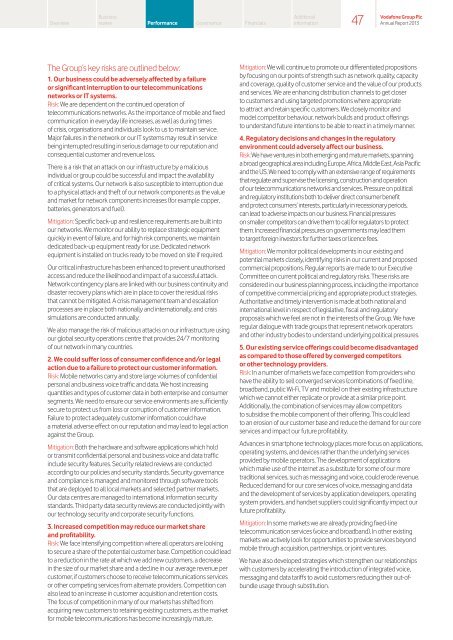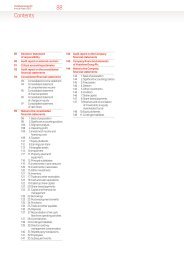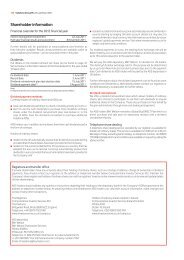The way ahead? - Vodafone
The way ahead? - Vodafone
The way ahead? - Vodafone
Create successful ePaper yourself
Turn your PDF publications into a flip-book with our unique Google optimized e-Paper software.
Overview<br />
Business<br />
review Performance Governance Financials<br />
<strong>The</strong> Group’s key risks are outlined below:<br />
1. Our business could be adversely affected by a failure<br />
or significant interruption to our telecommunications<br />
networks or IT systems.<br />
Risk: We are dependent on the continued operation of<br />
telecommunications networks. As the importance of mobile and fixed<br />
communication in everyday life increases, as well as during times<br />
of crisis, organisations and individuals look to us to maintain service.<br />
Major failures in the network or our IT systems may result in service<br />
being interrupted resulting in serious damage to our reputation and<br />
consequential customer and revenue loss.<br />
<strong>The</strong>re is a risk that an attack on our infrastructure by a malicious<br />
individual or group could be successful and impact the availability<br />
of critical systems. Our network is also susceptible to interruption due<br />
to a physical attack and theft of our network components as the value<br />
and market for network components increases (for example copper,<br />
batteries, generators and fuel).<br />
Mitigation: Specific back-up and resilience requirements are built into<br />
our networks. We monitor our ability to replace strategic equipment<br />
quickly in event of failure, and for high risk components, we maintain<br />
dedicated back-up equipment ready for use. Dedicated network<br />
equipment is installed on trucks ready to be moved on site if required.<br />
Our critical infrastructure has been enhanced to prevent unauthorised<br />
access and reduce the likelihood and impact of a successful attack.<br />
Network contingency plans are linked with our business continuity and<br />
disaster recovery plans which are in place to cover the residual risks<br />
that cannot be mitigated. A crisis management team and escalation<br />
processes are in place both nationally and internationally, and crisis<br />
simulations are conducted annually.<br />
We also manage the risk of malicious attacks on our infrastructure using<br />
our global security operations centre that provides 24/7 monitoring<br />
of our network in many countries.<br />
2. We could suffer loss of consumer confidence and/or legal<br />
action due to a failure to protect our customer information.<br />
Risk: Mobile networks carry and store large volumes of confidential<br />
personal and business voice traffic and data. We host increasing<br />
quantities and types of customer data in both enterprise and consumer<br />
segments. We need to ensure our service environments are sufficiently<br />
secure to protect us from loss or corruption of customer information.<br />
Failure to protect adequately customer information could have<br />
a material adverse effect on our reputation and may lead to legal action<br />
against the Group.<br />
Mitigation: Both the hardware and software applications which hold<br />
or transmit confidential personal and business voice and data traffic<br />
include security features. Security related reviews are conducted<br />
according to our policies and security standards. Security governance<br />
and compliance is managed and monitored through software tools<br />
that are deployed to all local markets and selected partner markets.<br />
Our data centres are managed to international information security<br />
standards. Third party data security reviews are conducted jointly with<br />
our technology security and corporate security functions.<br />
3. Increased competition may reduce our market share<br />
and profitability.<br />
Risk: We face intensifying competition where all operators are looking<br />
to secure a share of the potential customer base. Competition could lead<br />
to a reduction in the rate at which we add new customers, a decrease<br />
in the size of our market share and a decline in our average revenue per<br />
customer, if customers choose to receive telecommunications services<br />
or other competing services from alternate providers. Competition can<br />
also lead to an increase in customer acquisition and retention costs.<br />
<strong>The</strong> focus of competition in many of our markets has shifted from<br />
acquiring new customers to retaining existing customers, as the market<br />
for mobile telecommunications has become increasingly mature.<br />
Additional<br />
information<br />
47<br />
<strong>Vodafone</strong> Group Plc<br />
Annual Report 2013<br />
Mitigation: We will continue to promote our differentiated propositions<br />
by focusing on our points of strength such as network quality, capacity<br />
and coverage, quality of customer service and the value of our products<br />
and services. We are enhancing distribution channels to get closer<br />
to customers and using targeted promotions where appropriate<br />
to attract and retain specific customers. We closely monitor and<br />
model competitor behaviour, network builds and product offerings<br />
to understand future intentions to be able to react in a timely manner.<br />
4. Regulatory decisions and changes in the regulatory<br />
environment could adversely affect our business.<br />
Risk: We have ventures in both emerging and mature markets, spanning<br />
a broad geographical area including Europe, Africa, Middle East, Asia Pacific<br />
and the US. We need to comply with an extensive range of requirements<br />
that regulate and supervise the licensing, construction and operation<br />
of our telecommunications networks and services. Pressure on political<br />
and regulatory institutions both to deliver direct consumer benefit<br />
and protect consumers’ interests, particularly in recessionary periods,<br />
can lead to adverse impacts on our business. Financial pressures<br />
on smaller competitors can drive them to call for regulators to protect<br />
them. Increased financial pressures on governments may lead them<br />
to target foreign investors for further taxes or licence fees.<br />
Mitigation: We monitor political developments in our existing and<br />
potential markets closely, identifying risks in our current and proposed<br />
commercial propositions. Regular reports are made to our Executive<br />
Committee on current political and regulatory risks. <strong>The</strong>se risks are<br />
considered in our business planning process, including the importance<br />
of competitive commercial pricing and appropriate product strategies.<br />
Authoritative and timely intervention is made at both national and<br />
international level in respect of legislative, fiscal and regulatory<br />
proposals which we feel are not in the interests of the Group. We have<br />
regular dialogue with trade groups that represent network operators<br />
and other industry bodies to understand underlying political pressures.<br />
5. Our existing service offerings could become disadvantaged<br />
as compared to those offered by converged competitors<br />
or other technology providers.<br />
Risk: In a number of markets we face competition from providers who<br />
have the ability to sell converged services (combinations of fixed line,<br />
broadband, public Wi-Fi, TV and mobile) on their existing infrastructure<br />
which we cannot either replicate or provide at a similar price point.<br />
Additionally, the combination of services may allow competitors<br />
to subsidise the mobile component of their offering. This could lead<br />
to an erosion of our customer base and reduce the demand for our core<br />
services and impact our future profitability.<br />
Advances in smartphone technology places more focus on applications,<br />
operating systems, and devices rather than the underlying services<br />
provided by mobile operators. <strong>The</strong> development of applications<br />
which make use of the internet as a substitute for some of our more<br />
traditional services, such as messaging and voice, could erode revenue.<br />
Reduced demand for our core services of voice, messaging and data<br />
and the development of services by application developers, operating<br />
system providers, and handset suppliers could significantly impact our<br />
future profitability.<br />
Mitigation: In some markets we are already providing fixed-line<br />
telecommunication services (voice and broadband). In other existing<br />
markets we actively look for opportunities to provide services beyond<br />
mobile through acquisition, partnerships, or joint ventures.<br />
We have also developed strategies which strengthen our relationships<br />
with customers by accelerating the introduction of integrated voice,<br />
messaging and data tariffs to avoid customers reducing their out-ofbundle<br />
usage through substitution.











